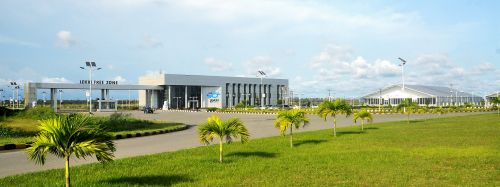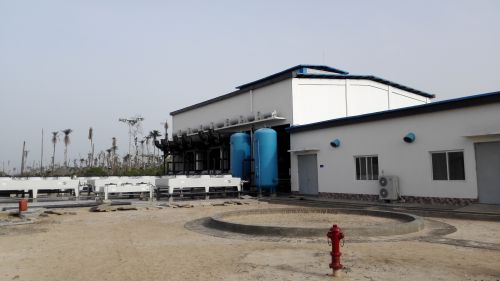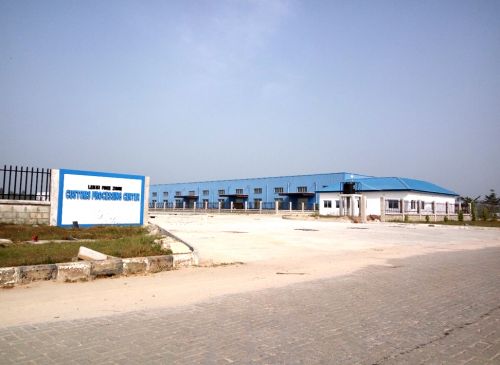
(Photo 5: Gatehouse of Lekki Free Zone)
By Zheng Jun, Huang Yan
Lekki Free Zone(LFZ) -- China-Nigeria Economic and Trade Cooperation Zone, is located in the Lekki peninsula, approximately 50 kilometers to the city center of Lagos which holds the biggest Nigeria trade, economic and financial hub. The entire zone is to be the satellite city of Lagos as well as the fastest growing place in Nigeria.
LFZ is established jointly by the Lagos State Government, Lekki Worldwide Investments Ltd. and China-Africa Lekki Investment Ltd.(CALI), which in turn is a joint venture of China Railway Construction Corporation Ltd.(CRCC), China Civil Engineering Construction Corporation(CCECC), China-Africa Development Fund Ltd. (CAD Fund) and Nanjing Jiangning Economic & Technological Development Corporation. LFZ was approved by the Chinese Ministry of Commerce in 2007 as its overseas economic and trade cooperation zones.
Till now, about 168 million US dollars has been invested in LFZ, 77 percent of which goes to the infrastructure construction. The 12MW Power Plant has started operation, making the zone one of the few institutions within Nigeria that can provide 24-hour, uninterrupted power supply. The completion of LFZ Customs Processing Center (CPC) greatly enhances a faster customs clearance process for the goods imported into LFZ.
Attracted by favorable investment environment, 48 enterprises, ranging from truck assembly, steel structure manufacturing, steel pipe & furniture manufacturing, generator manufacturing to import-export trade, have invested in the Zone with total investment of 140 million US dollars. Another 63 companies have either registered or signed investment MOU with prospective total investment of 600 million US dollars, and they are finalizing their investment agreements.

(Photo 6: A 12MW power plant in the Lekki Free Zone)
Nigeria’s government offers preferential policies to the investors in the LFZ, including: complete tax holiday for all Federal, State and Local Government taxes, rates, customs duties and levies; 100 percent repatriation of capital, profits and dividends; 99 years of land leasehold and 50 years of concessionary right of the zone’s operation & management; one-stop approvals for all permits, operating licenses and incorporation papers etc. Additionally, in 2016, the Central Bank of Nigeria has issued the Guidelines for Banking Operations in the Free Zones in Nigeria.
To help the Free Zone enterprises’ development, CALI fully utilizes its shareholders’ vast pool of resources by carefully identifying and actively promoting potential cooperation between interested investors and CALI’s shareholders. First, CALI harnesses CCECC and CRCC’s well established business networks and social influences in both China and Nigeria. The association of the LFZ with these corporate images is a boost of confidence and credibility to the potential investors. CALI helps the enterprises in the LFZ to gain foothold in Nigeria by introducing their products and services to CRCC and CCECC, who have obtained huge construction contracts in Nigeria and demand large amount of quality supplies. CAD Fund, currently China’s only operating fund specialized in Africa and CALI’s 2nd largest shareholder, can provide necessary financing if a project fits their investing criteria. CADF’s risk management and project management expertise will also help the investors to avoid detours and potholes.

(Photo 7: A Customs clearance center in the Lekki Free Zone)
CALI also catalyzes cooperation among the enterprises in the LFZ by building contacts and sharing information. Through CALI’s introduction, the companies can find suppliers/purchasers even before starting construction in Nigeria. This symbiotic ecology in the LFZ nurtured by CALI can greatly reduce its denizens’ investment risks and stimulate organic growth. For example, due to CALI’s introduction, Huachuang Steel Structure Engineering FZE., Asia-Africa International FZE., and Yu Long Steel Pipe (Lekki) Investment FZE, established close contact and formed business partnership with each other.
There are also setbacks in the development of LFZ. The deteriorating business environment of Nigeria caused by oil price plunge, the subsequent devaluation of naira, the underdeveloped infrastructure, and the high cost of financing are the main challenges faced by LFZ. However, we are still full of confidence in the future that LFZ will be built and turned into a satellite city of the mega city of Lagos, an ecological city with harmonious configuration of industries, a livable city full of vigor and a modern industrialized city with promising future. It will also become a driving force for Nigerian economic development and a showcase example of cooperation between China and Nigeria.




 A single purchase
A single purchase








